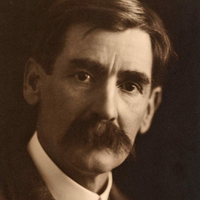Marshall’s Mate
You almost heard the surface bake, and saw the gum-leaves turn—
You could have watched the grass scorch brown had there been grass to burn.
In such a drought the strongest heart might well grow faint and weak—
'Twould frighten Satan to his home—not far from Dingo Creek.
The tanks went dry on Ninety Mile, as tanks go dry out back,
The Half-Way Spring had failed at last when Marshall missed the track;
Beneath a dead tree on the plain we saw a pack-horse reel—
Too blind to see there was no shade, and too done-up to feel.
And charcoaled on the canvas bag ('twas written pretty clear)
We read the message Marshall wrote. It said: 'I’m taken queer—
I’m somewhere off of Deadman’s Track, half-blind and nearly dead;
Find Crowbar, get him sobered up, and follow back,' it said.
'Let Mitchell go to Bandicoot. You’ll find him there,' said Mack.
'I’ll start the chaps from Starving Steers, and take the dry-holes back.'
We tramped till dark, and tried to track the pack-horse on the sands,
And just at daylight Crowbar came with Milroy’s station hands.
His cheeks were drawn, his face was white, but he was sober then—
In times of trouble, fire, and flood, ‘twas Crowbar led the men.
’Spread out as widely as you can each side the track,' said he;
‘The first to find him make a smoke that all the rest can see.’
We took the track and followed back where Crowbar followed fate,
We found a dead man in the scrub—but 'twas not Crowbar’s mate.
The station hands from Starving Steers were searching all the week—
But never news of Marshall’s fate came back to Dingo Creek.
And no one, save the spirit of the sand-waste, fierce and lone,
Knew where Jack Marshall crawled to die—but Crowbar might have known.
He’d scarcely closed his quiet eyes or drawn a sleeping breath—
They say that Crowbar slept no more until he slept in death.
A careless, roving scamp, that loved to laugh and drink and joke,
But no man saw him smile again (and no one saw him smoke),
And, when we spelled at night, he’d lie with eyes still open wide,
And watch the stars as if they’d point the place where Marshall died.
The search was made as searches are (and often made in vain),
And on the seventh day we saw a smoke across the plain;
We left the track and followed back—'twas Crowbar still that led,
And when his horse gave out at last he walked and ran ahead.
We reached the place and turned again—dragged back and no man spoke—
It was a bush-fire in the scrubs that made the cursed smoke.
And when we gave it best at last, he said, 'I’LL see it through,'
Although he knew we’d done as much as mortal men could do.
'I’ll not—I won’t give up!' he said, his hand pressed to his brow;
'My God! the cursed flies and ants, they might be at him now.
I’ll see it so in twenty years, 'twill haunt me all my life—
I could not face his sister, and I could not face his wife.
It’s no use talking to me now—I’m going back,' he said,
'I’m going back to find him, and I will—alive or dead!'
. . . . .
He packed his horse with water and provisions for a week,
And then, at sunset, crossed the plain, away from Dingo Creek.
We watched him tramp beside the horse till we, as it grew late,
Could not tell which was Bonypart and which was Marshall’s mate.
The dam went dry at Dingo Creek, and we were driven back,
And none dared face the Ninety Mile when Crowbar took the track.
They saw him at Dead Camel and along the Dry Hole Creeks—
There came a day when none had heard of Marshall’s mate for weeks;
They’d seen him at No Sunday, he called at Starving Steers—
There came a time when none had heard of Marshall’s mate for years.
They found old Bonypart at last, picked clean by hungry crows,
But no one knew how Crowbar died—the soul of Marshall knows!
And now, way out on Dingo Creek, when winter days are late,
The bushmen talk of Crowbar’s ghost 'what’s looking for his mate’;
For let the fools indulge their mirth, and let the wise men doubt—
The soul of Crowbar and his mate have travelled further out.
Beyond the furthest two-rail fence, Colanne and Nevertire—
Beyond the furthest rabbit-proof, barbed wire and common wire—
Beyond the furthest 'Gov’ment’ tank, and past the furthest bore—
The Never-Never, No Man’s Land, No More, and Nevermore—
Beyond the Land o’ Break-o’-Day, and Sunset and the Dawn,
The soul of Marshall and the soul of Marshall’s mate have gone
Unto that Loving, Laughing Land where life is fresh and clean—
Where the rivers flow all summer, and the grass is always green.

